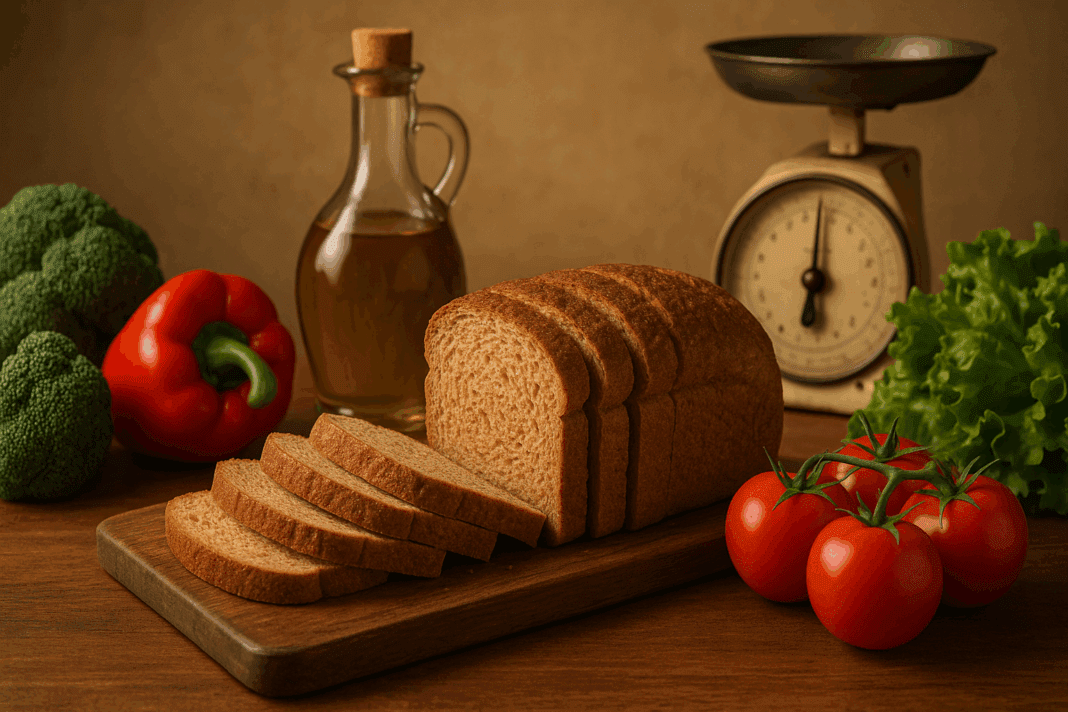Bread has long been a dietary staple in many cultures, from the dense rye loaves of Northern Europe to the airy flatbreads of the Middle East. Yet in the modern era of weight-conscious living, bread has been cast in a controversial light. One question continues to stir debate among dieters, fitness enthusiasts, and medical professionals alike: is bread bad when losing fat, or can wheat bread support weight loss? The answer, as nutrition experts increasingly emphasize, lies in context, quality, and balance.
You may also like: Expert-Backed Weight Loss Tips for a Healthier Lifestyle: What You Need to Know for Long-Term Weight Control and Wellness
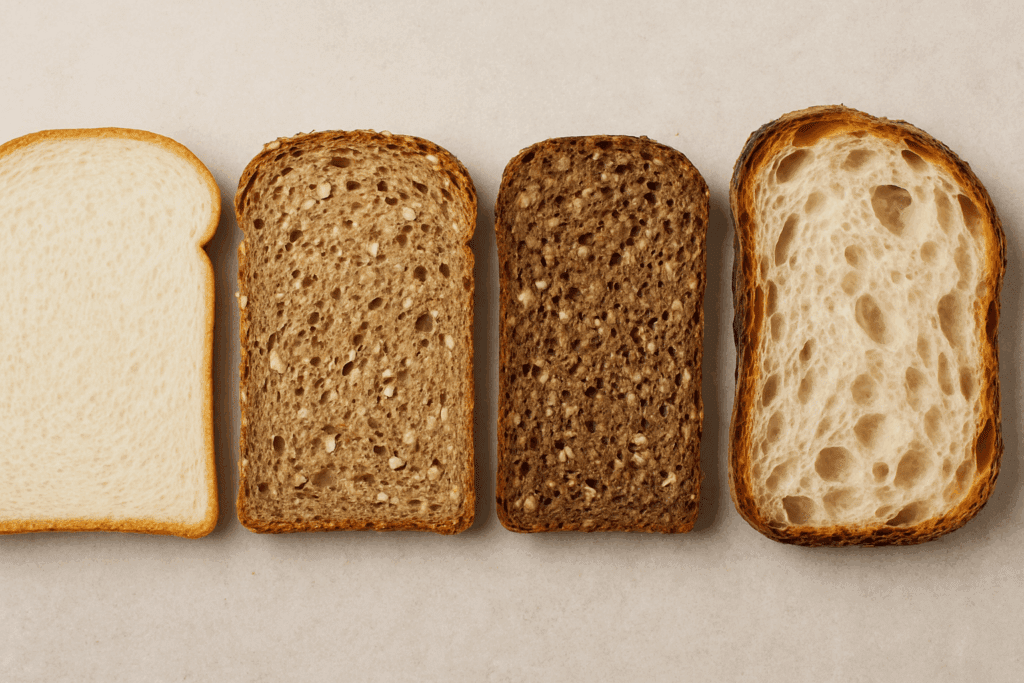
Understanding the Nutritional Complexity of Bread
To understand the role of bread in weight management, one must first examine its nutritional makeup. Bread is not a monolith; it varies widely in terms of ingredients, fiber content, glycemic index, and nutrient density. Highly processed white bread, often stripped of fiber and enriched artificially, spikes blood sugar rapidly and leaves little satiety behind. This type of bread has understandably drawn criticism in weight-loss circles. However, labeling all bread as detrimental overlooks the vast spectrum of options, particularly whole grain and wheat-based varieties that may, in fact, offer metabolic and satiety benefits.
Wheat bread, especially when made from 100% whole wheat, contains dietary fiber, plant-based protein, B vitamins, and essential minerals like magnesium and selenium. These nutrients play a critical role in digestion, muscle function, and energy metabolism. From a nutritional standpoint, wheat bread is markedly different from its refined white counterpart. As such, asking “is wheat bread good for weight loss” requires a nuanced answer that considers these nutritional distinctions. It is not simply about bread in isolation but how that bread interacts with the broader dietary pattern.
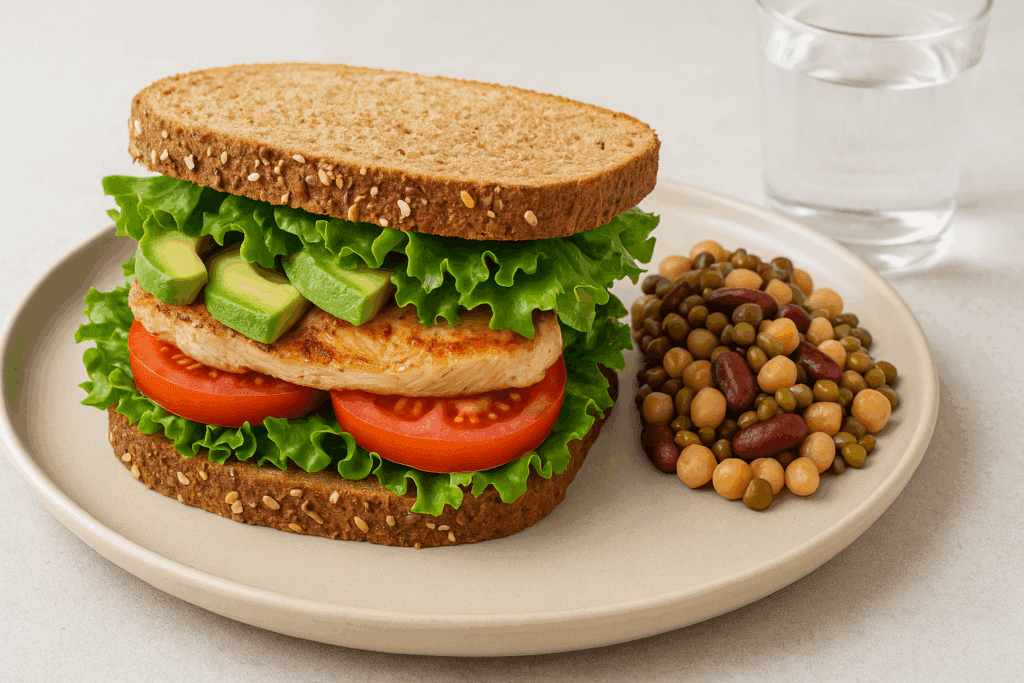
The Role of Fiber and Satiety in Fat Loss
One of the most important considerations in fat loss is satiety—the feeling of fullness that helps prevent overeating. Whole wheat bread provides a valuable source of dietary fiber, particularly insoluble fiber, which slows gastric emptying and extends the sensation of fullness. This satiety effect can help reduce overall calorie intake, a necessary condition for fat loss. Therefore, asking whether bread is bad when losing fat may miss the point if one is consuming high-fiber varieties that contribute positively to energy regulation.
Moreover, fiber-rich foods support healthy blood sugar levels by modulating glucose absorption. Stable blood sugar helps prevent insulin spikes, which are often associated with increased fat storage, particularly in the abdominal region. Wheat bread, when made with minimal added sugars and no refined flours, can be a useful tool in this regard. The benefits are amplified when such bread is consumed alongside protein and healthy fats, further blunting glucose responses and enhancing nutritional value.
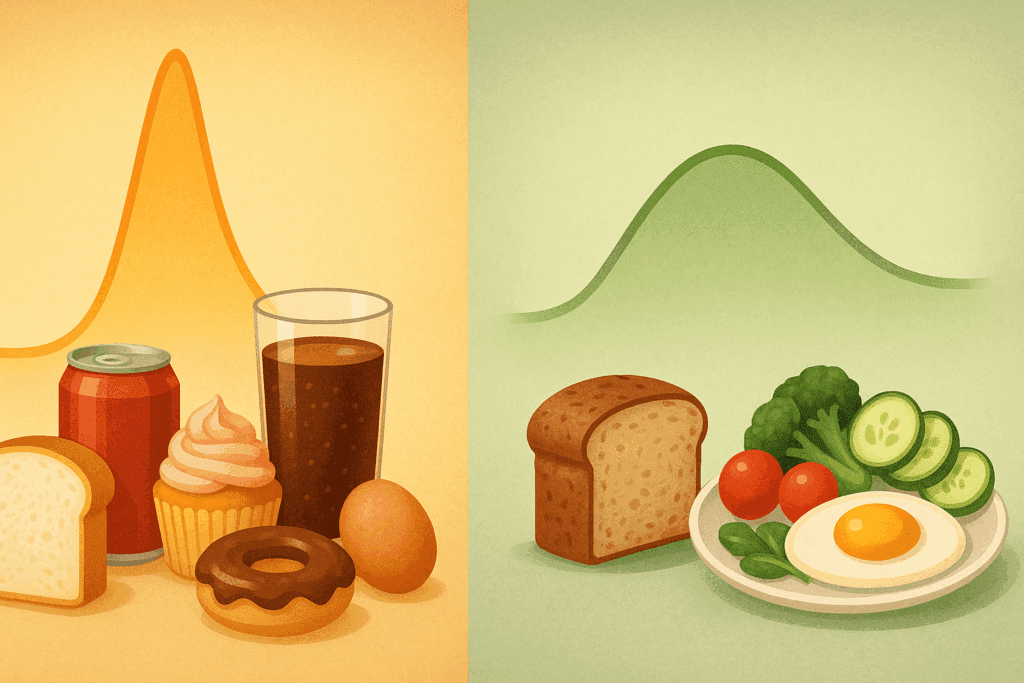
Glycemic Index and the Bread Conundrum
Bread has often been maligned for its effect on blood sugar, particularly among those with insulin resistance or type 2 diabetes. The glycemic index (GI) measures how quickly a food raises blood glucose, and white bread scores notoriously high. However, this does not apply universally to all bread. Whole wheat bread typically has a lower GI, particularly when made using traditional fermentation methods like sourdough, which further slow carbohydrate breakdown.
Understanding glycemic variability is crucial in answering whether bread is bad when losing fat. Rapid glucose spikes can drive hunger and fat storage, while stable responses support weight management. Choosing wheat bread with a lower GI, especially versions with intact grain kernels or added seeds, can contribute to metabolic health rather than undermine it. Additionally, the concept of glycemic load (GL), which considers portion size alongside GI, further clarifies that moderate servings of whole wheat bread may be entirely appropriate in a fat-loss diet.
Is Wheat Bread Good for Weight Loss When Paired with a Balanced Diet?
Nutrition experts emphasize that no single food determines fat loss. Weight management is about patterns, not isolated ingredients. In the context of a balanced diet rich in vegetables, lean proteins, healthy fats, and whole grains, wheat bread can be a nutritious inclusion. In fact, is wheat bread good for weight loss becomes a more relevant question when considering how it fits within meals.
A sandwich made with whole wheat bread, filled with grilled chicken, avocado, leafy greens, and a touch of olive oil-based dressing, delivers a fiber-rich, protein-packed meal that supports satiety and nutrient balance. Such a meal contrasts sharply with a white bread sandwich containing processed meat and mayonnaise. Therefore, the quality of the wheat bread and the nutritional context in which it is consumed matter immensely.
Moreover, research supports the inclusion of whole grains—including wheat bread—as part of a calorie-controlled diet for effective fat loss. Studies show that people who consume whole grains consistently tend to have lower body fat percentages and better cardiovascular profiles compared to those who consume refined grains. This evidence supports the idea that wheat bread, far from being inherently detrimental, can play a constructive role in weight management.

Behavioral and Psychological Aspects of Bread Consumption
Beyond the nutritional profile, there are psychological dimensions to bread consumption that can influence fat loss outcomes. For many individuals, bread evokes comfort, tradition, and pleasure. Eliminating it entirely may lead to feelings of deprivation, which can backfire and result in binge eating episodes or an unsustainable relationship with food.
The question of whether bread is bad when losing fat must also consider the emotional and behavioral context. Sustainable weight loss is not only a physiological process but also a psychological one. Allowing for moderate bread consumption—especially nutrient-rich wheat bread—can enhance adherence to a weight loss plan by reducing feelings of restriction. This psychological benefit, in turn, supports long-term success.
Additionally, the ritual of preparing or sharing a meal that includes bread can enhance mindfulness and enjoyment, both of which are linked to healthier eating behaviors. When bread is included intentionally and thoughtfully, it becomes part of a positive food experience rather than a trigger for overindulgence. Thus, wheat bread may support weight loss not only physiologically but emotionally as well.
Portion Control and Bread’s Place in Caloric Balance
Even the healthiest wheat bread contains calories, and overconsumption—of any food—can impede fat loss. Therefore, portion control remains essential. Nutritionists often recommend one to two slices of whole wheat bread per meal as a guideline, especially when paired with protein and fiber-rich sides. This approach ensures that bread contributes to the meal without overwhelming caloric needs.
Importantly, calorie density varies among bread types. Artisan whole grain loaves may be more calorically dense than commercial varieties, owing to added seeds and oils. While these additions provide beneficial fats and fiber, they also increase total calories. Understanding this trade-off helps individuals make informed decisions without vilifying bread itself. A moderate portion of dense, nutritious bread may offer more satiety and nutritional value than a larger portion of nutritionally inferior white bread.
Timing and Bread Consumption in Weight Loss
Another layer of nuance involves meal timing and metabolic response. Some experts suggest that consuming carbohydrates earlier in the day may be more beneficial for fat loss due to enhanced insulin sensitivity in the morning hours. This could mean that wheat bread is better incorporated at breakfast or lunch, where it can provide energy and support cognitive function throughout the day, rather than at dinner when the body is winding down.
The idea is not to demonize evening bread consumption but to align carbohydrate intake with periods of higher activity and metabolic demand. For example, a post-workout meal that includes wheat bread and lean protein can aid muscle recovery and glycogen replenishment. Thus, timing and activity level play important roles in determining whether bread helps or hinders weight loss efforts.
Expert Opinions and Evidence-Based Guidance
Leading dietitians and nutrition researchers consistently emphasize that weight loss is about overall energy balance, nutrient quality, and behavioral sustainability. From this perspective, is bread bad when losing fat becomes a misleading question. It is more accurate to ask how, when, and in what form bread is consumed.
Expert consensus suggests that whole grain breads, including those made from 100% whole wheat, can be part of a well-rounded weight loss strategy. The American Heart Association and the Dietary Guidelines for Americans both recommend making at least half of all grain servings whole grains. This endorsement reflects robust evidence linking whole grain intake with improved weight management and reduced chronic disease risk.
Moreover, emerging research suggests that gut microbiota may play a role in how individuals metabolize bread and other carbohydrates. Whole wheat bread, rich in prebiotic fibers, may support a healthier gut environment, which in turn may influence weight regulation and appetite signaling. While this field is still evolving, it offers yet another reason to consider wheat bread as potentially beneficial rather than problematic.
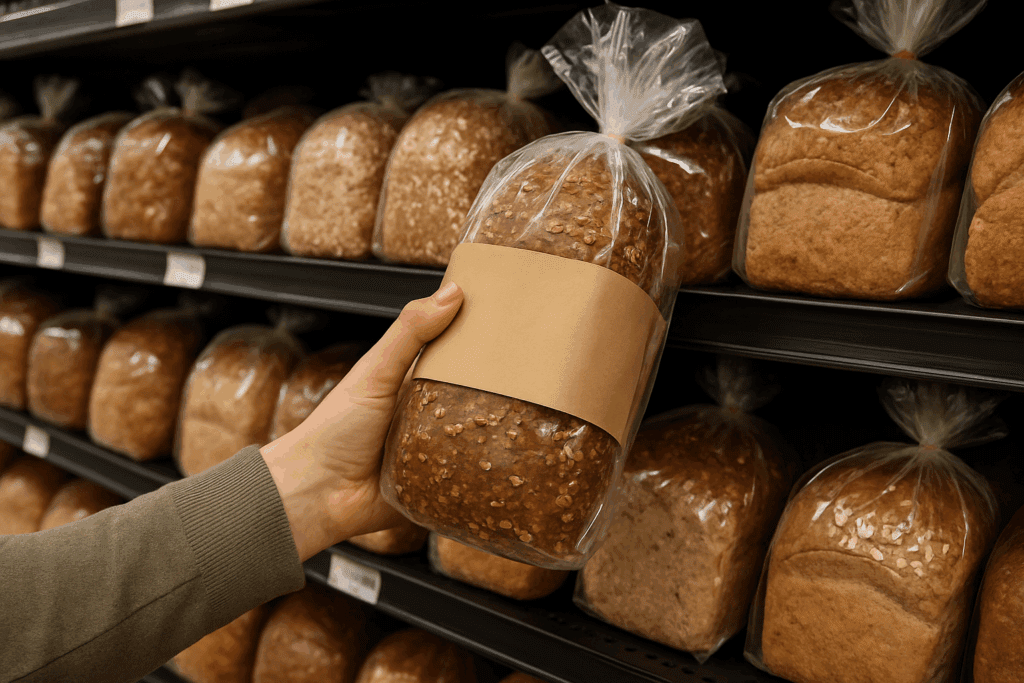
Practical Tips for Choosing the Right Bread
Navigating the bread aisle can be overwhelming, with countless options claiming to be healthy. To ensure that wheat bread supports weight loss rather than hinders it, consumers should look for a few key indicators. First, the ingredient list should start with “100% whole wheat flour,” not enriched or refined wheat. Second, aim for at least 3–5 grams of fiber per slice, which reflects a higher whole grain content. Third, check for added sugars—many commercial breads include them unnecessarily. Ideally, sugar should appear low on the ingredient list, if at all.
Additionally, breads that contain seeds, nuts, or ancient grains like spelt and quinoa can offer extra fiber, protein, and nutrients, making them more satiating and metabolically favorable. Portioning pre-sliced bread and storing it in the freezer can also help with portion control and reduce waste. Ultimately, making informed choices in the bread aisle empowers consumers to integrate bread into their diets without compromising weight loss goals.
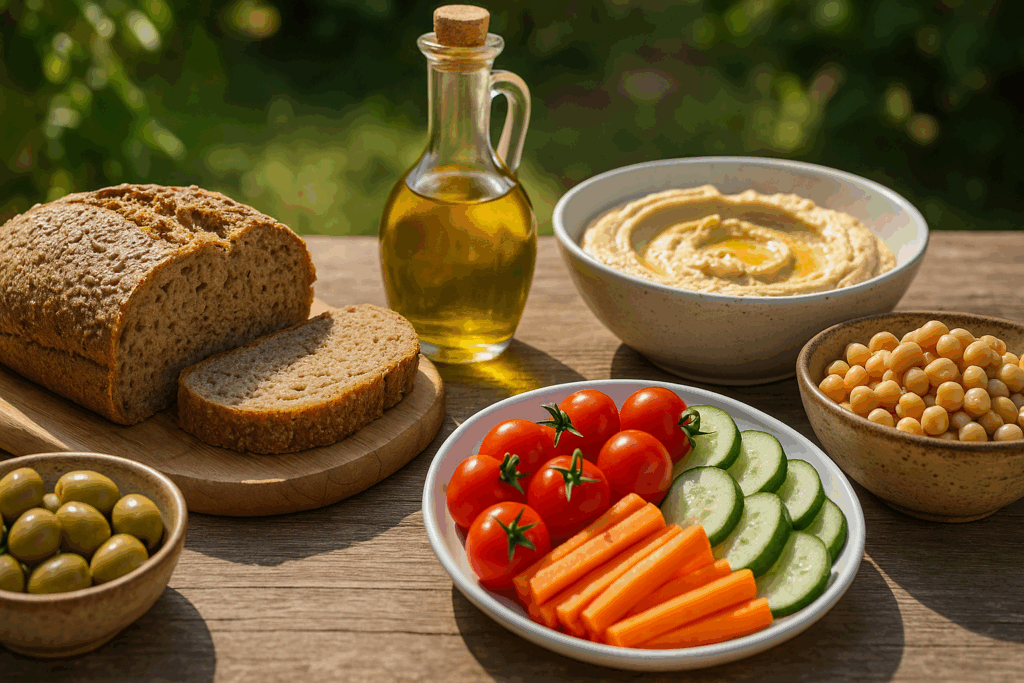
Wheat Bread in the Mediterranean and Other Healthy Diet Patterns
Wheat bread is a central component of the Mediterranean diet, widely regarded as one of the healthiest eating patterns in the world. In this dietary model, bread is consumed daily—but it’s usually whole grain, minimally processed, and eaten with olive oil, vegetables, or legumes rather than processed meats or sugary spreads. The Mediterranean diet is associated with lower rates of obesity, heart disease, and metabolic disorders, reinforcing the idea that wheat bread can support, rather than derail, a health-conscious lifestyle.
Similarly, traditional Asian and Middle Eastern diets often include bread-like staples made from whole grains, yet these cultures historically had lower obesity rates prior to the widespread adoption of ultra-processed foods. The global context suggests that bread itself is not inherently problematic, but the way it is processed, paired, and portioned plays a pivotal role in determining its effect on health and weight.
Frequently Asked Questions: Is Bread Bad When Losing Fat, or Can Wheat Bread Support Weight Loss?
1. Can including wheat bread in a low-calorie meal plan still support fat loss goals? Yes, including wheat bread in a structured low-calorie plan can still promote fat loss, particularly when portion sizes and overall nutrient balance are carefully considered. Whole wheat bread can provide essential fiber and slow-digesting carbohydrates that help prevent blood sugar spikes, support digestive regularity, and keep you feeling full longer. When calories are controlled and meals are well-balanced, wheat bread can be a helpful asset, not a hindrance. Rather than asking broadly, “is bread bad when losing fat,” it’s more effective to assess how wheat bread is used within a calorie-conscious, protein-rich, whole food-based approach. Selecting bread made from 100% whole wheat with minimal additives further enhances its value in a fat-loss plan.
2. How does wheat bread compare to gluten-free bread when trying to lose fat? The assumption that gluten-free bread is always better for fat loss is a common misconception. Many gluten-free breads are made from refined starches like white rice or potato flour, which lack the fiber and protein found in wheat bread. If your goal is fat reduction, the nutritional density and glycemic stability of 100% whole wheat bread often make it a superior choice, unless medically required to avoid gluten. Asking “is wheat bread good for weight loss” requires context—including what you’re comparing it to. Unless you have celiac disease or gluten sensitivity, wheat bread can provide more consistent energy and better appetite control than many gluten-free options.
3. Is bread bad when losing fat if eaten late at night? Timing plays a nuanced role in weight management, though total caloric intake over time is the primary driver of fat loss. Eating bread late at night isn’t inherently bad, but it’s often associated with mindless snacking or emotional eating, which can sabotage a calorie deficit. The real concern isn’t whether bread is consumed at 9 a.m. or 9 p.m., but whether it’s displacing more nutrient-rich or protein-based options. However, eating carbohydrates like wheat bread earlier in the day may support better energy metabolism and insulin sensitivity. Still, if your daily intake aligns with your fat loss targets, wheat bread can be part of a night meal without inherently being detrimental.
4. Can the fermentation process in some wheat breads improve their role in weight loss? Absolutely. Traditional sourdough fermentation partially breaks down gluten and lowers the glycemic response of bread, making it more digestible and metabolically favorable for some individuals. Fermentation also increases the availability of certain micronutrients and prebiotic compounds that support gut health—a growing area of research in weight management. So, when evaluating if wheat bread is good for weight loss, consider not just the ingredients but also the preparation method. Breads made with natural starters and long fermentation times can promote satiety and offer greater nutritional complexity compared to commercial loaves.
5. Is bread bad when losing fat if you’re following an intermittent fasting regimen? Bread can still fit within intermittent fasting protocols, as long as it is part of a balanced meal consumed during the eating window. In fact, some people find that whole wheat bread helps replenish energy and stabilize blood sugar after a fast, aiding in adherence to the overall plan. The key lies in pairing it with protein and fiber-rich foods, which further prolong satiety during fasting periods. The question isn’t just “is bread bad when losing fat,” but whether bread fits into your macronutrient goals and supports long-term sustainability. Whole grain wheat bread can be a practical post-fast carbohydrate that helps anchor a nourishing meal.
6. Do different types of wheat bread affect weight loss outcomes differently? Yes, not all wheat breads are created equal. Sprouted grain wheat breads, for instance, often have a lower glycemic index and greater nutrient bioavailability than standard whole wheat versions. Breads with seeds, ancient grains, or added legumes tend to offer more protein and fiber per slice, enhancing their fat-loss compatibility. Therefore, asking “is wheat bread good for weight loss” should prompt deeper evaluation of ingredient quality, fiber content, and nutrient density. The more intact and complex the grain structure, the better the bread tends to support metabolic health and fat reduction.
7. Can consuming wheat bread help regulate cravings during fat loss? Yes, and this is often an overlooked benefit. Restrictive dieting can trigger intense carbohydrate cravings, especially when carbs are heavily restricted. Incorporating a modest amount of whole wheat bread into meals can help reduce the psychological stress of dieting, minimize binge episodes, and increase compliance. By satisfying a craving in a controlled way, wheat bread can prevent feelings of deprivation that lead many diets to fail. So, the answer to “is bread bad when losing fat” may hinge on whether occasional, structured consumption actually improves adherence and psychological resilience.
8. How can athletes or highly active individuals use wheat bread during a fat loss phase? For active individuals, carbohydrates are a crucial fuel source, and wheat bread can play a strategic role in performance nutrition. Eating wheat bread before or after workouts can help replenish glycogen stores and prevent muscle breakdown, all while supporting fat loss through enhanced training quality. In these cases, the question isn’t whether wheat bread is good for weight loss, but how it fits into energy periodization. Athletes often benefit from nutrient-dense carb sources like whole wheat bread to maintain lean mass while creating a calorie deficit through training.
9. Is bread bad when losing fat for people with insulin resistance? For those managing insulin resistance, refined breads and high-glycemic carbs can indeed worsen metabolic outcomes. However, whole wheat bread with low added sugar and high fiber may actually support better glucose regulation and reduce insulin spikes. The key is individualized blood sugar response—some people tolerate wheat bread well, while others may experience a postprandial glucose surge. It’s worth monitoring personal reactions or consulting with a registered dietitian to tailor intake. Still, in controlled portions and with the right pairings, wheat bread is not categorically bad when losing fat for individuals with insulin sensitivity concerns.
10. What innovations in breadmaking are making wheat bread even better for weight loss? The rise of functional breads—fortified with plant protein, resistant starches, or gut-friendly fibers—has opened new doors for fat-loss-friendly baking. Innovations like the inclusion of flaxseed, psyllium husk, and fermented grains not only improve texture and flavor but also enhance satiety and blood sugar regulation. Some brands now produce wheat breads with over 6 grams of fiber per slice, a significant improvement over traditional varieties. As food technology evolves, the answer to “is wheat bread good for weight loss” becomes increasingly affirmative, provided consumers choose these enhanced formulations. These developments highlight how modern breadmaking is aligning more closely with weight-conscious and metabolic health goals.
Conclusion: Rethinking Bread’s Role in Weight Loss Through a Nuanced Lens
So, is bread bad when losing fat, or can wheat bread support weight loss? The evidence points clearly toward the latter, provided that the bread in question is made from whole grains, consumed in moderation, and integrated into a balanced, nutrient-rich diet. Far from being the dietary villain it is often made out to be, wheat bread—especially when minimally processed and fiber-rich—can actually contribute to satiety, metabolic health, and long-term dietary adherence.
The path to effective fat loss does not require the elimination of bread, but rather a thoughtful reconsideration of its type, timing, and context. Bread can be a powerful vehicle for nutrients, a satisfying component of meals, and a culturally significant part of a sustainable eating pattern. By shifting the conversation from avoidance to quality and intentionality, nutrition experts encourage a more compassionate, evidence-based approach to weight management—one that includes, rather than excludes, the foods we love in their healthiest forms.
As research continues to evolve and personalized nutrition gains traction, one message remains consistent: it is not whether you eat bread that matters most, but how you choose it, enjoy it, and balance it within your broader dietary journey. In that sense, wheat bread can indeed support weight loss—when consumed wisely, it becomes not an obstacle but an ally in the pursuit of health and wellness.
Further Reading:
11 Foods to Avoid When Trying to Lose Weight
Is Bread Bad for You? Nutrition Facts and More
Brown bread for weight loss: Is it better than other types of bread?


